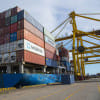Shipment delays raise fraud risks
Shipment delays and late presentation of documents in the export-import process raise the risks of fraudulence and money-laundering in Bangladesh, according to a survey.
In 47 percent cases, nominated banks of Bangladesh received discrepancy notices whereas local issuing banks served such notices on their foreign counterparts in 48 percent cases in 2018, said the survey report titled “Trade Services Operations of Banks”.
The Bangladesh Institute of Bank Management (BIBM) conducted the survey. Its Director Prof Shah Md Ahsan Habib presented the findings at a workshop at the BIBM auditorium in Dhaka yesterday.
According to the opinions of practitioners, the proportion of compliant letters of credit (LC) rose last year. However, banks received a greater number of spurious discrepancies.
The overdue bill of entry, an indication of unsettled cases of trade transactions, was 3,042 cases involving $2.33 billion, the report said.
The survey found huge knowledge gap among the traders for the pilling up of the overdue bills of entry and documentation discrepancies.
Compliance cost has already put huge burden on banks and cost-cutting measures in many instances created challenges for the bankers providing trade services, the report said.
Poor drafting of LC clause and inappropriate use of terms in trading became a matter of concerns for many of the trading partners.
“It is essential to work on the issues to uphold the country's reputation for the sake of competitiveness,” the report said.
Considering the concerning issues of trade-based money laundering, compliance requirements, and other financial crimes, the central bank has toughened requirements to enhance trade quality, said SM Moniruzzaman, a deputy governor of the Bangladesh Bank.
“Our policies have been developed as per market needs and risks.”
Private banks are the major shareholder in international trade facilitation. In 2018, they accounted for 75 percent of export finance, followed by foreign banks 19 percent and state-owned banks 7 percent, according to the report.
Documentary credit, considered the best payment methods from country risk and money-laundering risks perspective, remained the most prominent payment technique in import and export transactions.
In documentary credit, LC is used to offer financing to importers. And in the payment process, a bank itself is a party and commercial risks are well-distributed between traders and banks.
In 2018, 98 percent import payments from Bangladesh were made through LC in terms of volume. It was more than 94 percent in terms of number of cases.
This is sharp contrast to the global practice in general where 80 percent payment transactions take place through open account, a payment method which poses higher risk of money-laundering.
In the open account method, transactions take place mainly between exporters and importers and it is risky for exporters and there is insignificant involvement of banks. There is also limited control of regulators, greater involvement of country risk and higher money-laundering risk in the open account method, the report said.

 For all latest news, follow The Daily Star's Google News channel.
For all latest news, follow The Daily Star's Google News channel. 






Comments